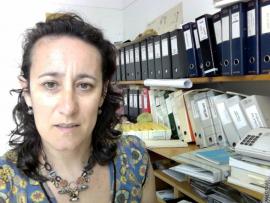Ana Cristina Costa is a marine biologist and associate professor at the Department of Biology, University of the Azores, phD in Marine Sciences (Marine Ecology) in 2004, ACC has been developing teaching and research activities in this department since 1990.
She has been responsible for teaching several courses in the Biology undergrad degrees (Biology and Biological Sciences and Health) such as invertebrate zoology, oceanography coastal biology, marine ecology and toxicology as well as in master degrees (eg. Master Course in Biodiversity and Island Ecology, Erasmus Mundus Master Program in Marine Spatial Planning) and phD graduate program in Biology.
She has supervised several ungrad and grad (master and phD) students and young pos doc researchers. Her main interest is marine biodiversity and ecology and, to a lesser extent, taxonomy. She has also interests in marine environmental monitoring (under WFD and MDFD), conservation and planning (CZMP and MSP). Her more recent research has been in marine non indigenous species.



